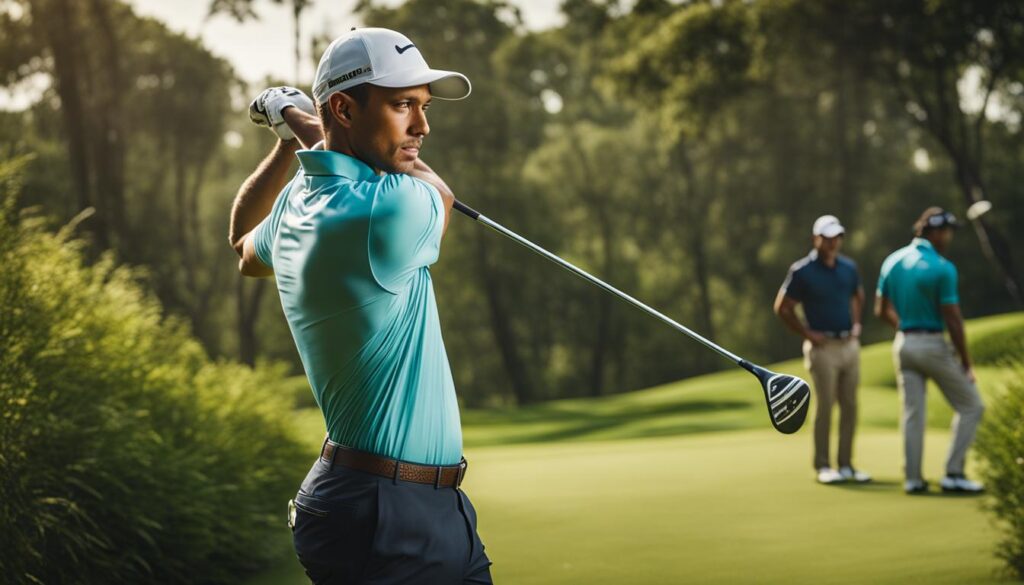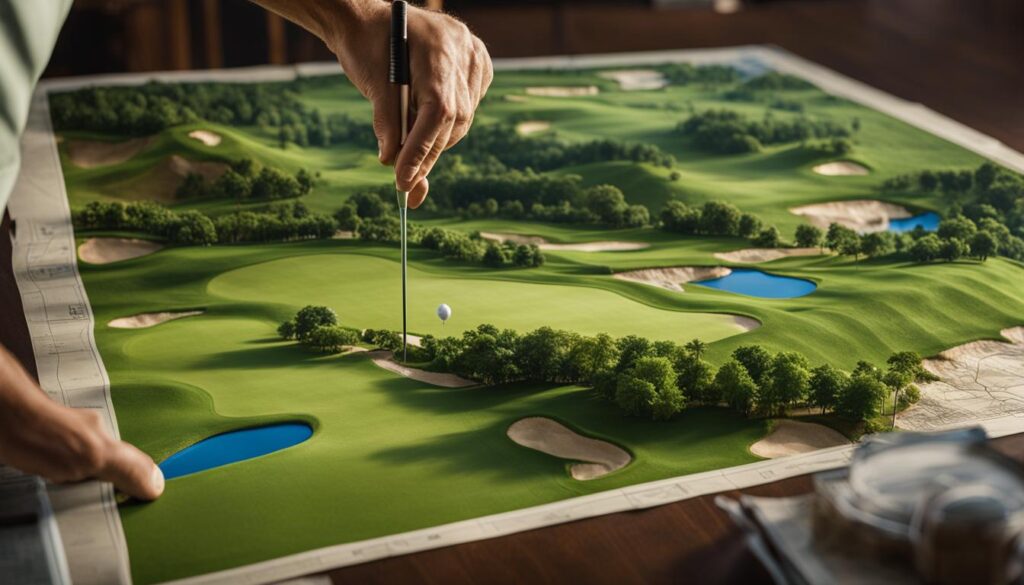We may earn money or products from the companies mentioned in this post.
Are you a golf enthusiast looking to improve your game? If so, then golf therapy and rehabilitation may be just what you need. This specialized program focuses on restoring balance, reducing the risk of injury, and improving overall golf-specific functionality. By working with experienced rehabilitation specialists, you can enhance your physical capabilities and take your golfing experience to the next level.
In this section, we will explore the benefits of golf therapy and rehabilitation in detail. We will look at the importance of golf rehabilitation in aiding injury treatment and recovery, and how physical therapy techniques can optimize your performance on the golf course. Additionally, we will discuss the role of golf rehabilitation specialists and how prevention is essential in avoiding golf injuries. Lastly, we will examine the mental and emotional aspects of golf therapy and how performance enhancement strategies can positively impact your game.
Key Takeaways
- Golf therapy and rehabilitation can enhance your golfing skills and overall well-being.
- Physical therapy techniques and exercises can optimize your performance on the golf course.
- Golf rehabilitation specialists can provide personalized treatment plans and expert guidance.
- Injury prevention exercises, proper warm-up routines, and body conditioning are vital in reducing the risk of common golf-related injuries.
- Mental and emotional aspects of golf therapy can positively impact your game, including visualization techniques, mindfulness practices, and performance enhancement strategies.
The Importance of Golf Rehabilitation
Golf is a physically demanding sport that requires a lot of repetitive motions, which can put a significant amount of stress on the body. This can lead to injuries that can impact a golfer’s ability to play. Golf rehabilitation plays a critical role in helping golfers recover from injuries and return to the game safely.
There are different types of golf injuries, including strains, sprains, and overuse injuries. These injuries can affect different parts of the body, including the back, shoulders, elbows, wrists, hips, and knees. Golf rehabilitation can aid in the treatment of these injuries by providing specialized exercises and techniques to restore strength, flexibility, and mobility in the affected areas.
Golf Injury Treatment
Golf rehabilitation specialists use various treatment methods to help golfers recover from injuries. These methods include manual therapy, therapeutic exercises, and modalities such as heat, ice, and electrical stimulation. These techniques can help reduce pain, inflammation, and muscle spasms.
Therapeutic exercises are an essential part of golf rehabilitation. These exercises are designed to improve flexibility, range of motion, strength, and balance. Golf-specific exercises can target the muscles and joints that are used in the golf swing, helping to improve overall golf-specific functionality.
| Injury Type | Treatment Method |
|---|---|
| Rotator Cuff Strain | Manual therapy, therapeutic exercises |
| Tennis Elbow | Modalities, therapeutic exercises |
| Low Back Pain | Manual therapy, therapeutic exercises, modalities |
The Benefits of Golf Rehabilitation
Golf rehabilitation can provide many benefits, such as reducing pain, restoring function, and improving performance. Rehabilitation can help golfers get back to playing the sport they love without pain or discomfort. It can also help prevent future injuries by addressing underlying issues that can lead to injury.
Golf rehabilitation can also help improve performance by optimizing physical capabilities. Golf-specific exercises can help improve flexibility, strength, and balance, which can lead to a more consistent swing and better ball control.
Working with a golf rehabilitation specialist can provide personalized treatment plans, specialized exercises, and expert guidance that can help golfers recover from injuries and improve their performance on the course.
Enhancing Performance through Golf Therapy
Golf therapy is a specialized form of physical therapy that aims to enhance golfers’ performance on the course by improving their physical abilities and addressing any physical limitations that may affect the golf swing. By incorporating golf-specific rehabilitation exercises and techniques, golf therapy can also help prevent injuries and improve overall golf-specific functionality.
Golf Physical Therapy
Golf physical therapy is a key component of golf therapy and rehabilitation. It involves a comprehensive evaluation of golfers’ physical abilities, including strength, flexibility, balance, and mobility. Based on the evaluation results, a personalized treatment plan is devised to improve any physical limitations that may affect the golf swing.
The treatment plan may include a range of golf-specific rehab exercises, such as exercises to improve hip rotation, shoulder mobility, and trunk stability. These exercises are designed to enhance golfers’ swing mechanics, ball control, and overall game.
Golf-Specific Rehab Exercises
Golf-specific rehab exercises are designed to improve golfers’ physical abilities and address any physical limitations that may affect the golf swing. These exercises are often performed with the help of golf-specific equipment, such as resistance bands, stability balls, and foam rollers.
Some examples of golf-specific rehab exercises include:
- Single-leg balance exercises to improve stability and balance during the golf swing
- Rotator cuff strengthening exercises to improve shoulder stability and mobility
- Core strengthening exercises to improve trunk stability and rotation
- Hip rotation exercises to improve hip mobility and rotation during the golf swing
Golf-Specific Rehab Training Programs
Golf-specific rehab training programs combine golf physical therapy and golf-specific rehab exercises to address any physical limitations that may affect the golf swing. These programs are designed to enhance golfers’ swing mechanics, ball control, and overall game through improving their physical abilities.
Golf-specific rehab training programs may include:
- Biomechanical analysis to identify areas of physical limitation that may affect the golf swing
- Golf-specific rehab exercises to address any physical limitations that may affect the golf swing
- Golf-specific strength training to improve stability, power, and endurance during the golf swing
- Golf-specific flexibility training to improve range of motion and mobility during the golf swing
Overall, golf therapy and rehabilitation can help enhance golfers’ performance on the course by addressing any physical limitations that may affect the golf swing. By incorporating golf-specific rehab exercises and techniques, golf therapy can also help prevent injuries and improve overall golf-specific functionality.
Working with Golf Rehabilitation Specialists
Collaborating with experienced golf rehabilitation specialists is essential for effective treatment and long-term success. These professionals have specialized training and expertise in the unique physical demands of golf and can tailor treatment plans to meet your specific needs.
Physical therapists are one type of specialist that can help you recover from golf-related injuries. They can provide hands-on therapy, prescribe targeted exercises, and guide you through a rehabilitation program to restore your strength, flexibility, and mobility.
Chiropractors are another type of specialist who can help you recover from injuries and prevent future ones. They can provide spinal adjustments, soft tissue therapy, and other techniques to improve your joint mobility and reduce pain and stiffness.
When selecting rehabilitation specialists, look for those with experience treating golfers and a strong understanding of the biomechanics of the golf swing. They should also have access to the latest technologies and techniques for optimal treatment outcomes.
Preventing Golf Injuries through Therapy
As every golfer knows, injuries can be a major setback, both physically and mentally. A well-designed golf therapy program can help identify potential issues before they escalate into injuries and dramatically reduce the risk of common golf-related injuries.
Golf therapy for injury prevention involves tailoring exercises and therapy to meet individual needs. Golfers can work with rehabilitation specialists to identify areas of weakness and potential issues with their swing or other motions, and then develop an effective program to address these concerns.
One of the key components of golf injury prevention is proper warm-up routines and body conditioning. Golfers should stretch and warm up properly before playing or practicing, paying particular attention to the areas of the body that are most prone to injury, such as the back, shoulders, and wrists.
Weight training and other forms of conditioning can also help prevent injury by strengthening the muscles, improving flexibility, and increasing overall endurance. By incorporating these exercises into a golf therapy program, golfers can reduce their risk of injury and continue to play their best.
Ultimately, golf therapy for injury prevention is about maintaining a balanced and injury-free game. By focusing on proper technique, form, and conditioning, golfers can keep playing the sport they love for years to come.
Performance Enhancement Strategies for Golfers
Improving your performance on the golf course requires more than just physical rehabilitation. The mental and emotional aspects of golf therapy can positively impact your game, leading to a more successful golfing journey. Here are some effective golf performance enhancement strategies:
Visualization Techniques
Visualization can help golfers boost their confidence and focus. By picturing a successful shot in their minds, golfers can train their brain to execute the shot more efficiently. Visualization can also help reduce anxiety and stress, leading to improved performance and mental clarity on the course.
Mindfulness Practices
Mindfulness practices, such as meditation and deep breathing exercises, can help golfers stay present and focused during their rounds. By quieting the mind and tuning into their surroundings, golfers can improve their ability to concentrate, stay relaxed, and perform to the best of their abilities.
Performance Enhancement Strategies
Performance enhancement strategies, such as goal setting and positive self-talk, can help golfers stay motivated and confident. By setting achievable goals and focusing on their strengths, golfers can boost their self-esteem and stay committed to their game. Positive self-talk can also combat negative thoughts and help golfers stay focused on the task at hand.
Table: Benefits of Performance Enhancement Strategies
| Benefits of Performance Enhancement Strategies | |
|---|---|
| Boosts confidence and self-esteem | Helps golfers stay motivated and committed to their game |
| Reduces anxiety and stress | Improves mental clarity and focus on the course |
| Improves concentration and relaxation | Facilitates better performance and overall game satisfaction |
Overall, incorporating mental and emotional strategies into your golf therapy and rehabilitation program can help you achieve a well-rounded approach to the sport, leading to enhanced performance and a more enjoyable golfing experience.
Conclusion
In summary, golf therapy and rehabilitation can significantly improve your golfing skills while also benefitting your overall health. By focusing on restoring balance, preventing injuries, and enhancing performance, golf therapy can help you unlock your game and reach new levels of success on the course.
Working with experienced golf rehabilitation specialists can provide you with personalized treatment plans and specialized exercises that address your specific needs. By incorporating functional movement and biomechanical analysis, these specialists can help you optimize your physical capabilities and improve your swing and ball control.
Preventing injuries is crucial for maintaining a balanced and injury-free game, and a well-designed golf therapy program can help you achieve this. By practicing injury prevention exercises, proper warm-up routines, and body conditioning, you can reduce the risk of common golf-related injuries and play with confidence.
However, improving your golfing skills goes beyond physical rehabilitation. Mental and emotional aspects of golf therapy can also positively impact your game. Visualization techniques, mindfulness practices, and performance enhancement strategies can help you stay focused, confident, and resilient during your rounds of golf.
To sum up, golf therapy and rehabilitation offer a comprehensive approach to improving your golfing experience. Seek out the guidance of golf rehabilitation specialists and explore the benefits of this specialized therapy for a fulfilling and successful golfing journey.
FAQ
What is golf therapy and rehabilitation?
Golf therapy and rehabilitation is a specialized program that focuses on optimizing golfers’ physical capabilities to enhance their performance on the golf course. It involves techniques, exercises, and training programs specifically designed for golfers to improve their swing, ball control, and overall game.
How can golf therapy and rehabilitation help improve my performance?
Golf therapy and rehabilitation can help improve your performance by addressing physical limitations, restoring balance, and reducing the risk of injury. By enhancing your golf-specific functionality through specialized exercises and training, you can experience improved swing mechanics, increased power and accuracy, and overall better play on the golf course.
Can golf therapy prevent injuries?
Yes, golf therapy can help prevent injuries by identifying potential issues and implementing injury prevention exercises and conditioning programs. By maintaining proper body mechanics, flexibility, and strength, you can reduce the risk of common golf-related injuries and keep your game balanced and injury-free.
How do I find a golf rehabilitation specialist?
To find a golf rehabilitation specialist, you can reach out to physical therapists, chiropractors, or other healthcare professionals experienced in golf therapy. They can provide personalized treatment plans, specialized exercises, and expert guidance tailored to address your specific golf-related concerns and help improve your game.
Is golf therapy only for professional golfers?
No, golf therapy is beneficial for golfers of all skill levels, from beginners to professionals. Whether you are looking to recover from an injury, enhance your performance, or prevent future injuries, golf therapy can provide specialized techniques and exercises to meet your individual needs and help you unlock your game.
Affiliate Disclosure: This post may contain affiliate links. If you purchase through our link, we may receive a small commission, but at no additional cost to you. For more information, please see our Disclosure statement.



